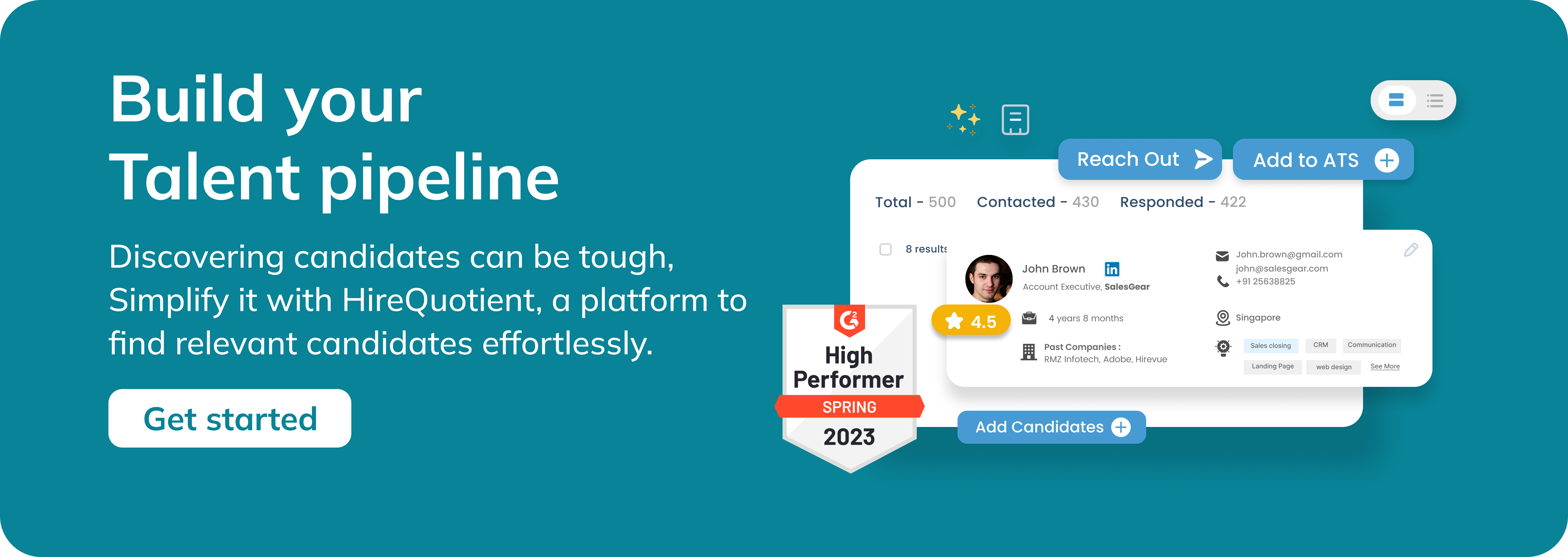Everything you need to know about Social Recruiting
Published on December 6th, 2022
LinkedIn.. Twitter.. Instagram.. Facebook..
No no, we are not listing your favorite social media platforms! Rather shedding light on the new buzzword, “Social Recruiting”.
Did you know that 84% of companies are currently using social media for recruiting, according to SHRM. And that is totally believable, given that almost three-fourths of people aged between 18-34 get their jobs from social media.
Now that you’re stuck and looking to read further…
Are you ready for a deep dive into social recruiting?
What is Social Recruiting?
Recruiting through social media is as straightforward as the phrase suggests.
Using social media to find, attract, and interact with prospects is known as social recruitment.
With each like, share, and comment, social media offers a singular opportunity to connect with candidates where they spend the most time online, build organic employer brand awareness that endures, and reach the extended networks of your candidate audience.
This is in contrast to traditional talent acquisition tactics and channels like job boards and job advertising.
How Does Social Recruitment Work?
Social media tools range from a level of rudimentary to advanced. Some platforms merely assist users in finding a candidate's contact information. On the other hand, there are systems that have combined machine learning and artificial intelligence (AI) to focus searches, target messages, and produce leads.
Using job descriptions as a guide, AI can locate and rank candidates on social media who may fit the bill. It is then up to the company to get in touch with these passive applicants and ask whether they are interested in talking about jobs.
For example, LinkedIn provides resources for locating passive applicants. Companies can discover possible targets for talent espionage with the aid of its Talent Insights analytics. By calculating the volume of LinkedIn InMail, the technology may also calculate attrition rates and the need for workers with specific skill sets.
Twitter enables businesses to communicate information about their company, including links to open positions. Similar features are available on Facebook, but this platform also allows for the posting of photographs and videos. Instagram is an excellent platform for sharing images and videos that emphasize the corporate culture of your business and present new products and services.
How is Social Recruiting Beneficial?
Social recruiting has done wonders in the past year and is continuing to grow at a speed that is faster than light. The GenZ are hooked to social media 24*7, however, the millennials and GenX are not behind and are coping with every update on social media.
Since social media is so rooted in our daily lives now, recruitment has taken a big leap and transitioned to social recruiting for better talent hire.
The benefits of social media recruitment are
Increased Job Visibility
These days, almost every suitable candidate you might take into consideration for any position at your firm is on social media. Over 2.19 billion people use Facebook regularly. The option to organize job search chats on Twitter is well-liked, and a large percentage of millennials and members of Generation X actively utilize LinkedIn as a forum for job searching.
Everywhere you turn, social networks are being used as fantastic venues for finding and hiring great people to work for your clients. There aren't many other platforms that can reach as many people as social media, thus you are likely to find talent that other platforms can't even come close to matching.
Better Employer Brand Awareness
In addition to helping you identify the right individual, social recruiting is efficient at raising awareness of your business. You can build your brand and inspire some amount of trust in potential employees by posting job openings on social media.
Brands with a large social media following are seen as more reliable by consumers. In light of this, it would be beneficial for your company to create a strong social media presence. This will not only help you locate qualified candidates for employment, but it will also help your company gain the trust of future clients and become a sought-after place to work.
Lesser Cost of Hire
It can be highly expensive to hire new employees. Although social recruiting is less expensive, it still has a high cost. However, the value of the recruits you create using social networking sites makes this strategy quite affordable.
Without a doubt, the costs associated with hiring through social media are typically lower than those of other approaches. For instance, a straightforward Facebook advertisement can increase your visibility more than two times compared to more conventional hiring practices like classified ads in newspapers and job boards.
Lesser Hiring Time
In general, traditional hiring techniques take more time than social media hiring techniques. This means that social media is the medium to take into account when you have an open position that needs to be filled as quickly as possible. Social networking services not only make it simple and quick to contact applicants, but they also enable them to answer more quickly. As a result, great working connections frequently develop.
Additionally, hiring from a talent pool that includes candidates that reflect the hiring manager's or company's beliefs, interests, and preferred working methods typically speeds up the process of finding the right candidate. This is excellent news for both the party recruiting and the applicants looking to land a job.
You Get to Know the Candidate Better
It is no longer a secret that employers use social media to learn more about the candidates they have hired for their organizations. Many people view social media platforms as unrestricted venues where they can vent their frustrations, discuss their issues, and share their daily experiences. You might be surprised to learn that prospective employers look candidates up on social media.
They can see more about the potential hires on social networking sites. By learning about the candidate's personalities, they can learn about their goals and what to anticipate from them after they hire them to work for their company.
Choosing the right social media platform
LinkedIn continues to be the hub of the social media world for many recruiters. In one of its global recruiting surveys, the provider of recruitment platforms SocialTalent discovered that 98% of all recruiters utilize LinkedIn.
There are other worthwhile targets besides popular social media platforms like Facebook and Instagram. On websites that serve both social media and professional purposes, there are skilled people who are more active. Dribbble, a network for designers, and GitHub, a platform for software development, are examples of this.
Compared to older folks, younger professionals are typically more active on social media platforms like Instagram and TikTok.
It's vital to keep in mind that people frequently build online communities based on common interests or personal affinities and gravitate toward social media platforms that support or appeal to these interests. For instance, individuals who want to engage in conversation about current events or at the very least share their opinions tend to flock to Twitter and Reddit, whereas Pinterest tends to draw more visually inclined users who build communities around similar concepts.
Successful social media recruiters are aware of these differences between platforms and are able to tailor their messaging to the various types of engagements that are common on each one, which is essential for sparking interest and conversation. They also understand when to restrict or refrain from recruiting on websites where the activities are incompatible with the organization's reputation, brand, and values
HR specialists can choose the platforms that employ the experts that most closely fit their work requirements by understanding each platform's characteristics.
Effective recruiters also know how to make the most of the resources available on the many websites to engage potential applicants.
Best Social Recruiting Practices
After quickly discussing some advantages of social media use in recruitment, let's look at some best practices. Despite the fact that best practices can change depending on your candidate's personas and target market, talent acquisition professionals should adhere to a few guidelines.
Improve your social media profiles
Your company's culture and key principles should be reflected in the social media profiles you utilize for hiring. For employer branding and talent acquisition, several businesses set up separate Facebook and Instagram profiles.
In this manner, you are able to concentrate entirely on your candidate persona and not your company's buyer persona. You may highlight the information candidates are seeking and focus your messaging and communication on potential job seekers.
Pick the right channels
Today, there are numerous social media platforms available. It is crucial to comprehend each channel's operation and target audience. For instance, while Instagram might be the best option for marketing to people in the design, marketing, retail, and related industries, this platform might not be the ideal option for developers.
Rather, some organizations have started sourcing developers through specialized social media sites and forums like Reddit, GitHub, and StackOverflow.
Make use of appealing images and captions
Use kind but direct language when posting job openings on social media, and always include an image that makes it clear who you're searching for.
The majority of social media feeds—63%, or two-thirds—consist of pictures, according to Buffer's data. Because of this, information with appropriate visuals sees a 94% greater reaction rate than content without.
Common Social Recruiting Mistakes to Avoid
When using social media for recruiting, recruiters should be cautious not to take any actions that can backfire and result in poor online engagement with possible candidates or, worse, the loss of promising leads.
The following social media hiring blunders should be avoided:
- being overly active or inactive with engagement efforts;
- bombarding potential candidates with messages;
- sending inconsistent or even contradictory messages in the content posted on the organization's website and social media platforms;
- failing to understand the qualities of ideal candidates or where and how to best reach them on social media;
- and failing to provide user-friendly pathways to move from social media platforms to the application process.
In Conclusion
Social media platforms put your organization in a brighter light. As GenZ and millennials make up the major workforce, social recruiting is going to be a valuable asset for recruiters in the very near future.
If you're implementing social media recruiting for the first time, you should exercise patience throughout the entire hiring process. Rome wasn't built in a day, and neither will your brand's presence on social media.
There is no cause for hesitation for recruiters before using a social media recruiting approach. It only works for you and your candidates if it has been thoroughly thought out.
Ready to go social?
Authors

Radhika Sarraf
Radhika Sarraf is a content specialist and a woman of many passions who currently works at HireQuotient, a leading recruitment SaaS company. She is a versatile writer with experience in creating compelling articles, blogs, social media posts, and marketing collaterals.
Hire the best without stress
Ask us how
Never Miss The Updates
We cover all recruitment, talent analytics, L&D, DEI, pre-employment, candidate screening, and hiring tools. Join our force & subscribe now!
Stay On Top Of Everything In HR



